(Learning Teaching Training Activities)
The Fashion DIET project has as main objectives (i) the development of a new continuing education module, (ii) a portal with e-learning tools, and (iii) teaching and learning materials to improve the key competencies of lecturers, teachers, trainers, students and young textile specialists in regard to implementing Education for Sustainable Development (ESD) as a guiding principle in textile education.
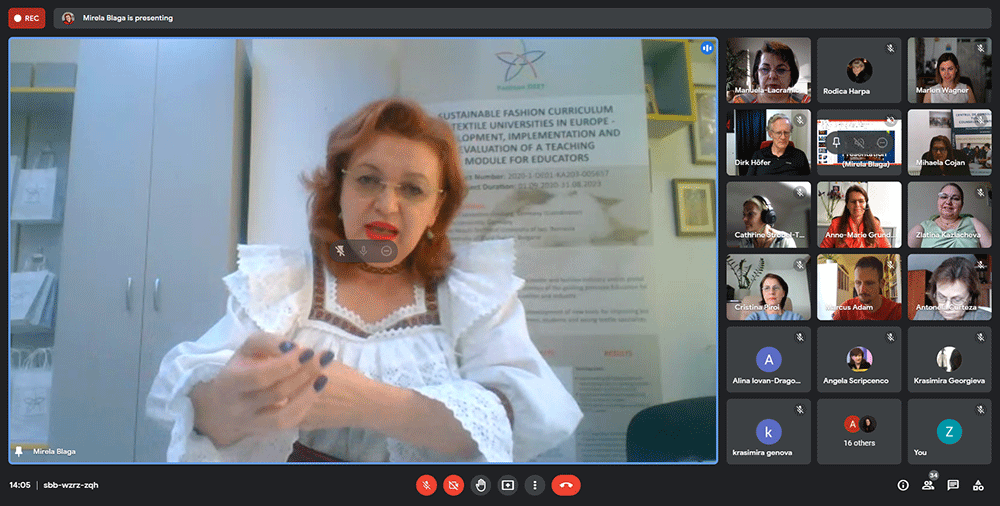
The “Gheorghe Asachi” Technical University of Iaşi, through the Faculty of Industrial Design and Business Management (FIDBM), is one of four partners in the Fashion DIET project.
From 2 to 4 June 2021, FIDBM hosted the LTT-Fashion DIET (Learning, Training and Teaching activities) event, which covered topics related to the concept of sustainability for the textile sector. This event was attended by the members of the consortium: University of Education in Freiburg, Germany as coordinator, Reutlingen University in Germany, “Gheorghe Asachi”‘ Technical University in Iasi, Romania, and Trakia University in Stara Zagora in Bulgaria as partners, furthermore representatives of German research institutes and universities, and representatives of Bulgarian and Romanian textile and fashion companies.
In detail, professors of the University of Applied Sciences Albstadt-Sigmaringen, the University of Applied Sciences Hannover, PhD and master students at the FIDBM attended the conference. Also present were representatives of the following Romanian textile and fashion companies: SC Katty-Fashion SRL, Iasi; SC Pandora-Prod SRL, Focșani; SC Gemini CAD Systems, Iași; SC Lidia Mod Collection, Pașcani; Best Smart Consulting-Bucharest. Furthermore, teachers in high-school education, professors from the “Aurel Vlaicu” University of Arad, from the Technical University of Moldavia from Chișinău, vocational counsellors and psychologists, respectively members of the TUIASI academic community took part in the event.
The introductory presentations provided an in-depth insight into the project’s main goal of integrating Education for Sustainable Development(ESD) as a guiding principle into textile education:
- ESD as a Guiding Principle in Textile Education – What does that mean? (Prof. Dr. Anne-Marie Grundmeier, University of Education Freiburg)
- Safety and Health: Selected Aspects along the Textile Chain and in the Fashion Market (Prof. Dr. Dirk Höfer, University of Education Freiburg);
Best practice examples from stakeholders in Germany, Romania and Bulgaria by Ms Catinerina Ailiesei, Katty Fashion Romania, Mr Michael Möller, Hohenstein Institute Germany, and Dr. Ivelin Rahnev from E. Miroglio EAD, Bulgaria followed, leading to a lively discussion at the end of the first day.
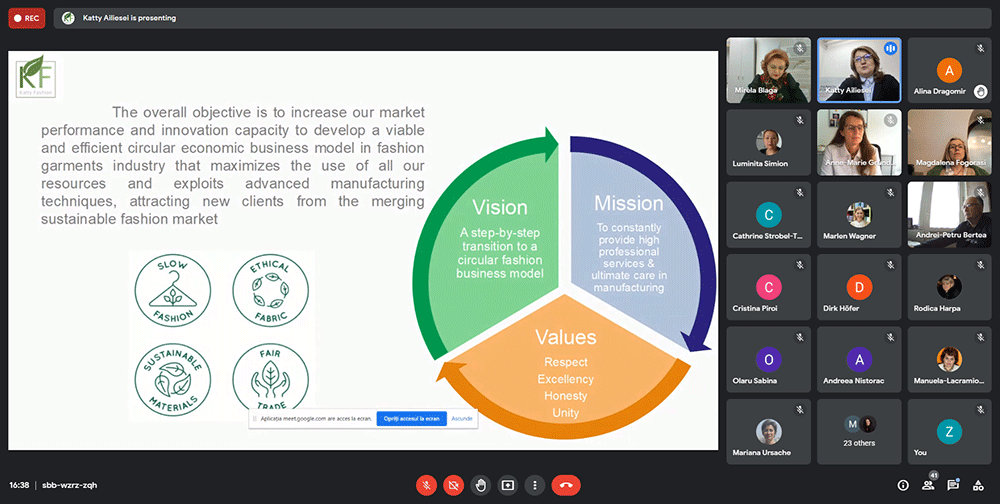
The lectures of the second and third day opened a space for an exchange of views related to the European fashion market and consumer behaviour, the ESD further education module and its access via a database:
- Fashion Market and Sustainability: Time to Rethink Business and Research (Dr. Marcus Adam, Reutlingen University);
- Introduction into the Fashion DIET Website and the Information and E-Learning Portal (Marlen Wagner, Reutlingen University).
The two thematic workshops created a space for interactivity and exchange of views related to sustainability in education and creative teaching methods, which can also been applied in the field of textile engineering:
- Workshop with the ESD Further Education Module (Prof. Dr. Jochen Strähle)
- How to Approach ESD by Design Thinking (Prof. Dr. Anne-Marie Grundmeier).
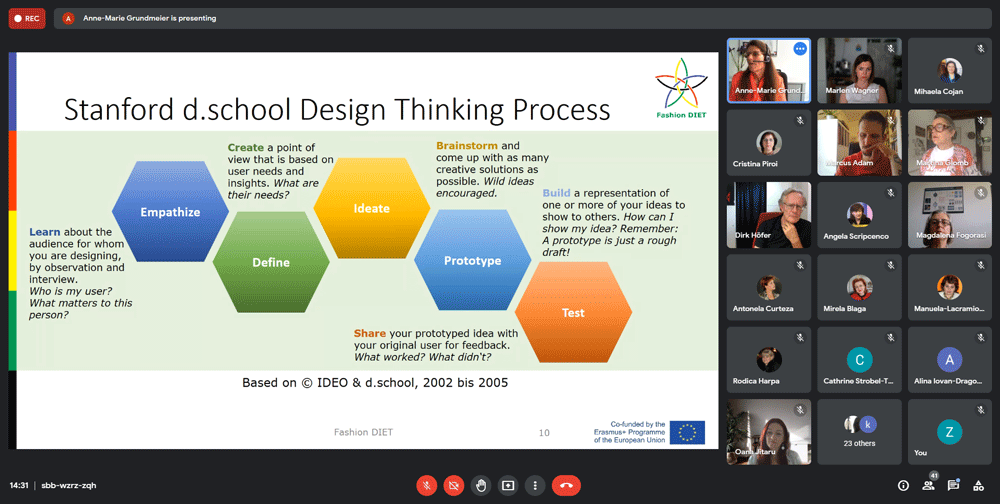
The third day closed with two contributions on selected aspects of sustainability. On the one hand, Prof. Manuela Bräuning provided an interesting insight in the connection between smart textiles and sustainability, and on the other hand, Prof. Martina Glomb profoundly explained her way of teaching sustainable fashion design strategies.
- Smart Textiles and Sustainability in Teaching (Prof. Manuela Bräuning, University of Applied Sciences Albstadt-Sigmaringen);
- Use-Less: Challenging Slow Fashion Design Strategies (Prof. Martina Glomb, University of Applied Sciences Hannover).
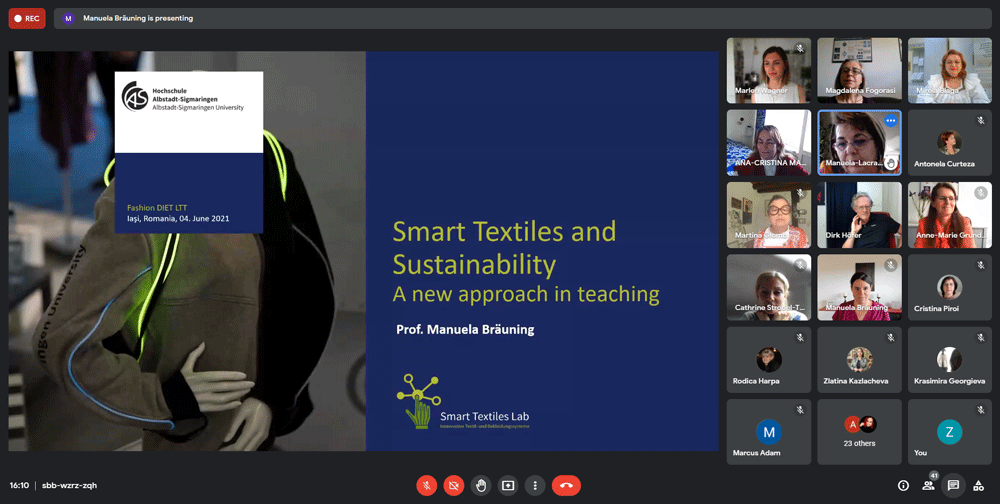
Although the LTT took place in a virtual environment, this event was also one of cultural exchange between the participating countries.
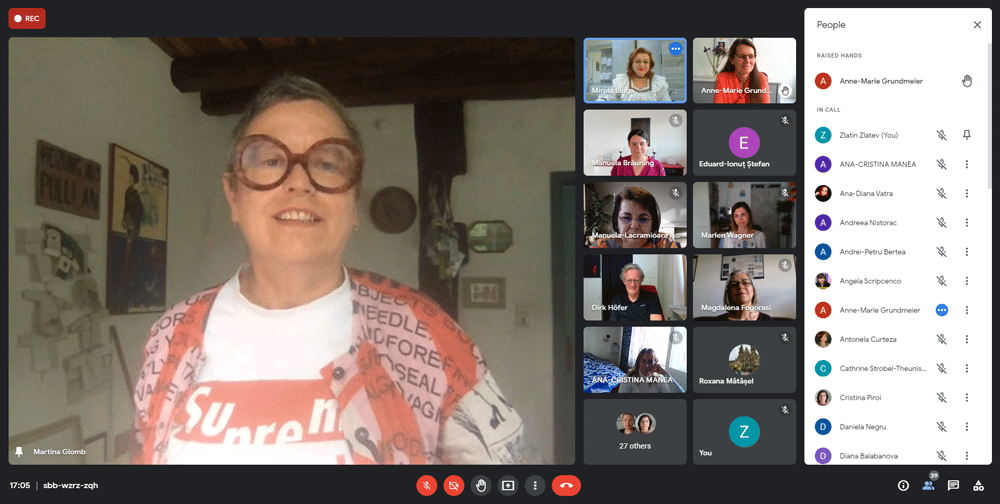


Figure 7: The Fashion DIET Project Members after the 2nd Day of the LTT-Event
Within the next two years, the Fashion DIET project will generate research-based teaching and learning material for higher and school education under the guiding principle of ESD. At the end of the project, these materials will be available via an information and e-learning portal intending to educate the educators and to enable them as multipliers. This approach enhances the quality and international standing of European higher education and its contribution to society, which is the main objective of the Erasmus+ Programme.
Fashion DIET consortium, June 2021

